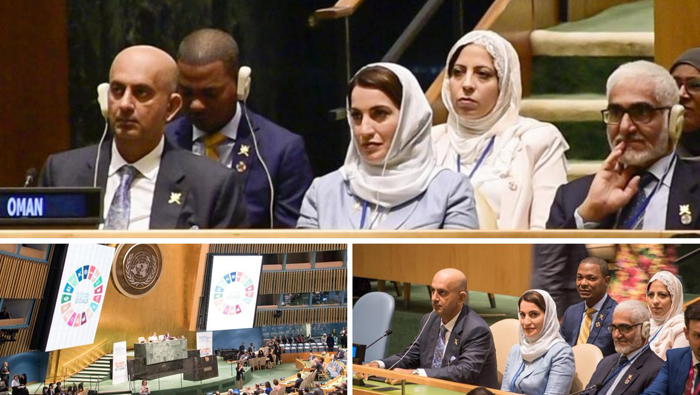
Muscat: Oman’s deputy chairman of the Supreme Council for Planning has arrived in New York to present before the United Nations the Sultanate’s plans to meet the 2030 Sustainable Development Goals.
Dr. Ali bin Masoud Al Sunaidy, who also serves as the nation’s Minister of Commerce and Industry, has departed for the US with a delegation that includes representatives from various public and private academic institutions that will help make these goals a reality on the ground.
The Sustainable Development Goals (SDGs) are part of the UN’s efforts to ensure fair living, employment, healthcare and education standards for all, as well as protecting the Earth’s environment and safeguarding its land and marine life. They are split into 17 objectives that it is pushing for member nations to achieve, as part of the 2030 Agenda for Sustainable Development, which was adopted by all UN Member States in 2015.
To ensure that countries are moving towards these SDGs, they undertake Voluntary National Reviews that document the actions they have taken to achieve the goals. Oman will submit its first Voluntary National Review at the High Level Political Forum, which is being held at the UN headquarters. Oman’s efforts to achieve these SDGs are spearheaded by the National Committee for achieving the Sustainable Development Goals, which falls under the administration of the Supreme Council for Planning.
The council and those that carry out the needful to ensure that Oman meets the targets, are taking stringent actions to ensure that the Sultanate enjoys a sustainable, successful future, so much so that achieving the SDGs has been made a priority as part of the Sultanate’s Vision 2040, providing it with additional momentum.
“Oman’s determination to achieve the goals and targets set out in the 2030 Agenda for Sustainable Development constitutes a natural extension of the values and principles of sustainability, equality, justice, peace, engagement, and “leaving no one behind” that have been deeply rooted in Omani society since its inception,” said Al Sunaidy, in this context.
“This reality is clearly reflected in the Basic Statute of the State and the addresses of His Majesty Sultan Qaboos bin Said, which have always been a reference framework to all development plans and programmes in the Sultanate,” he added.
“As a result, Oman has made remarkable achievements in key economic, social, environmental, cultural, and political areas of sustainable development over the past few years.”
This report details the various steps Oman is taking to ensure that it can achieve the 17 objectives set out by the SDGs. These include ending poverty, eliminating hunger, ensuring good health and well being, access to quality education, gender equality, clean water and sanitation, affordable and clean energy, decent work and economic growth, industry, and innovation and infrastructure.
It also includes reduced inequalities, sustainable cities and communities, responsible consumption and production, climate action, preserving life, both on land and under water, the enforcement of peace, justice and strong institutions, and the creation of partnerships to ensure these goals are recognised.
One of the ways in which Oman has made efforts to take sustainable and successful steps to achieve these SDGs is by engaging directly with the public, as well as various ministries and government bodies at both the national and the governorate level. It has also incorporated the achievement of the 17 SDGs as of the key targets of its 9th Five Year Plan, which runs from 2016 to 2020.
“Omani youth were involved to better understand their aspirations and priorities, as well as the initiatives that can expedite the achievement of the SDGs,” said the report. “More than 40 panel discussions were organised with the aim of introducing participants to the views of the concerned ministries and bodies on the 9th Five Year Plan’s proposed objectives and pillars, its sectoral components, macroeconomic management plans and financial policies, the investment programme, governorate development, the private sector and economic diversification, employment policies, Omanisation and youth programmes.
“Five workshops were held to appraise successful international examples and apply lessons learned that are appropriate for the Sultanate’s conditions,” added the report. “Dialogue sessions covered Oman’s promising sectors, namely manufacturing, transport and logistic services, tourism, fisheries, and mining, in addition to ICTs, education, health, agriculture and environment, with the aim of finding a common ground between sectoral strategies and the Sustainable Development Agenda.”
Oman’s Ambassador to the United Nations, invited everyone in the Sultanate to follow the latest developments that took place in New York, shedding light on the areas Oman was paying attention to.
“We have also paid special attention to empowering women and to ensure that their rights are respected and promoted as they rightly deserve, in this golden era,” said Dr Mohammed Al Hassan, Oman’s Permanent Representative to the UN. “All these programmes and initiatives will be presented before the international community. The Oman delegation to the UN will conduct and participate in a number of events and programmes to shed light on our country’s efforts.”
He added: “Our country will present its first Voluntary National Review, which will exhibit the steps and efforts undertaken by Oman in becoming one of the first countries in the region towards achieving the goals and recommendations of the SDG Agenda in the areas of health, education, child and maternal care services.”